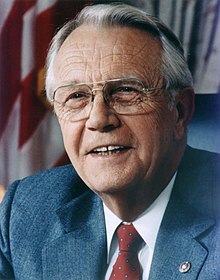
Back وينديل فورد Arabic وينديل فورد ARZ وندل اچ. فورد AZB Wendell Ford German Wendell Ford Spanish وندل اچ. فورد Persian Wendell H. Ford French Wendell H. Ford Hungarian Wendell Ford ID Wendell Ford Italian
Wendell Ford | |
|---|---|
 Official portrait, c. 1990s | |
| Senate Minority Whip | |
| In office January 3, 1995 – January 3, 1999 | |
| Leader | Tom Daschle |
| Preceded by | Alan Simpson |
| Succeeded by | Harry Reid |
| Senate Majority Whip | |
| In office January 3, 1991 – January 3, 1995 | |
| Leader | George J. Mitchell |
| Preceded by | Alan Cranston |
| Succeeded by | Trent Lott |
| United States Senator from Kentucky | |
| In office December 28, 1974 – January 3, 1999 | |
| Preceded by | Marlow Cook |
| Succeeded by | Jim Bunning |
| 53rd Governor of Kentucky | |
| In office December 7, 1971 – December 28, 1974 | |
| Lieutenant | Julian Carroll |
| Preceded by | Louie Nunn |
| Succeeded by | Julian Carroll |
| 45th Lieutenant Governor of Kentucky | |
| In office December 12, 1967 – December 7, 1971 | |
| Governor | Louie Nunn |
| Preceded by | Harry Lee Waterfield |
| Succeeded by | Julian Carroll |
| Member of the Kentucky Senate from the 8th district | |
| In office January 1, 1966 – December 12, 1967 | |
| Preceded by | Casper Gardner |
| Succeeded by | Delbert S. Murphy |
| Personal details | |
| Born | Wendell Hampton Ford September 8, 1924 Owensboro, Kentucky, U.S. |
| Died | January 22, 2015 (aged 90) Owensboro, Kentucky, U.S. |
| Resting place | Rosehill Elmwood Cemetery |
| Political party | Democratic |
| Spouse |
Ruby Jean Neel (m. 1943) |
| Children | 2 |
| Alma mater |
|
| Military service | |
| Allegiance | |
| Branch/service | |
| Years of service | 1944–1946, 1949–1962 |
| Rank | |
| Unit | Kentucky Army National Guard |
| Battles/wars | World War II |
| Awards | |
Wendell Hampton Ford (September 8, 1924 – January 22, 2015) was an American politician from Kentucky. He served for twenty-four years in the U.S. Senate and was the 53rd Governor of Kentucky. He was the first person to be successively elected lieutenant governor, governor, and United States senator in Kentucky history.[1] He was the Senate Democratic whip from 1991 to 1999, and was considered the leader of the state's Democratic Party from his election as governor in 1971 until he retired from the Senate in 1999.[2] At the time of his retirement he was the longest-serving senator in Kentucky's history, a mark which was then surpassed by Mitch McConnell in 2009. He is the most recent Democrat to have served as a Senator from the state of Kentucky.
Born in Daviess County, Kentucky, Ford attended the University of Kentucky, but his studies were interrupted by his service in World War II. After the war, he graduated from the Maryland School of Insurance and returned to Kentucky to help his father with the family insurance business. He also continued his military service in the Kentucky Army National Guard. He worked on the gubernatorial campaign of Bert T. Combs in 1959 and became Combs' executive assistant when Combs was elected governor. Encouraged to run for the Kentucky Senate by Combs' ally and successor, Ned Breathitt, Ford won the seat and served one four-year term before running for lieutenant governor in 1967. He was elected on a split ticket with Republican Louie B. Nunn. Four years later, Ford defeated Combs in an upset in the Democratic primary en route to the governorship.
As governor, Ford made the government more efficient by reorganizing and consolidating some departments in the executive branch. He raised revenue for the state through a severance tax on coal and enacted reforms to the educational system. He purged most of the Republicans from statewide office, including helping Walter Dee Huddleston win the Senate seat vacated by the retirement of Republican stalwart John Sherman Cooper. In 1974, Ford himself ousted the other incumbent senator, Republican Marlow Cook. Following the rapid rise of Ford and many of his political allies, he and his lieutenant governor, Julian Carroll, were investigated on charges of political corruption, but a grand jury refused to indict them. As a senator, Ford was a staunch defender of Kentucky's tobacco industry. He also formed the Senate National Guard Caucus with Missouri senator Kit Bond. Chosen as Democratic party whip in 1991, Ford considered running for floor leader in 1994 before throwing his support to Connecticut's Christopher Dodd. He retired from the Senate in 1999 and returned to Owensboro, where he taught politics to youth at the Owensboro Museum of Science and History.
© MMXXIII Rich X Search. We shall prevail. All rights reserved. Rich X Search